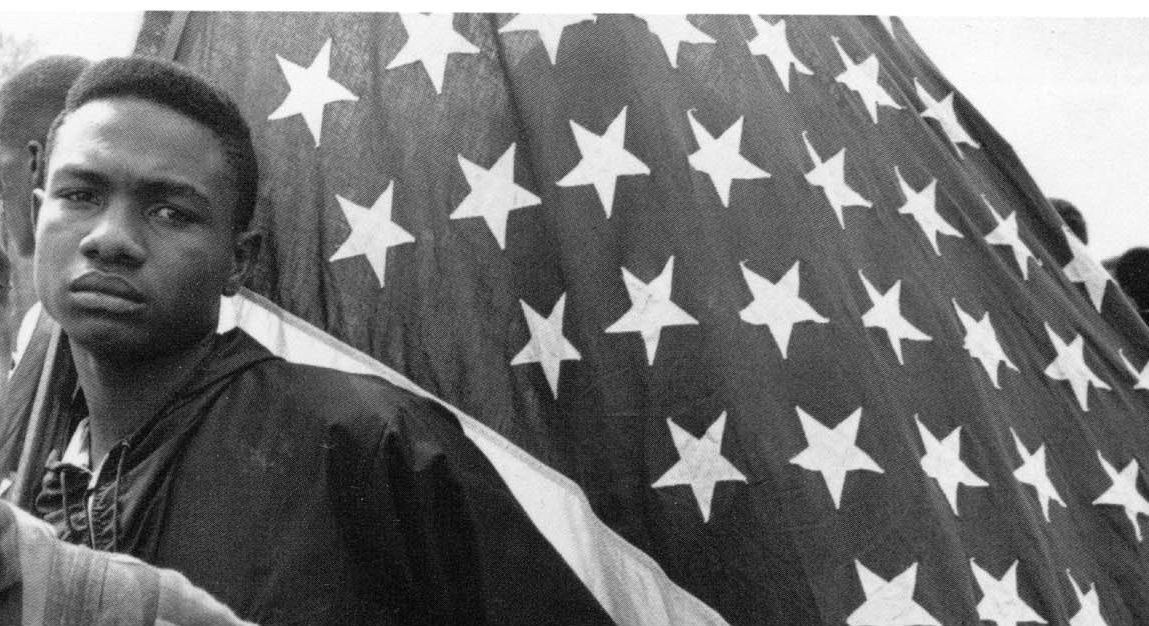Throughout the history of the United States, government at all levels has been an oppressive force on people of color, especially black people.
Videos by Rare
The republic was founded with African chattel slavery implicitly recognized in the Constitution. After Reconstruction, state and local governments enacted harsh laws and stripped rights from freedmen, ushering an era of white American terrorism that was aided, abetted, and sometimes perpetrated by law enforcement itself. One hundred years after Emancipation, police sicced dogs and firemen turned fire hoses on men, women, and children alike who were peacefully appealing for equal treatment, dignity, and individual rights.
Today, police officers sometimes harass, profile, and abuse black people in cities all over the nation, contributing to the disproportionate number of blacks and other minorities in jails and prisons in the country that leads the world in incarceration. Given this historical experience with the government, why aren’t there more black libertarians?
First, libertarianism is an ideology or philosophy that is fully separated from the red team/blue team worldview that dominates American politics. While many Americans consider themselves “fiscally conservative and socially liberal,” not many spend the time and effort to delve into exactly what they believe and why, let alone the centuries-old philosophical underpinnings which may describe their views on some level.
Given the many practical concerns people face on a daily basis, the myriad media at the disposal of the average American for learning and entertainment, the inscrutability of philosophers’ writings, and the so-named “dismal science” of economics, perhaps the better question is: why are there any self-identified libertarians in the first place?
More seriously, given libertarianism’s rather esoteric foundations and the dominance of the Democrat/Republican political dichotomy, that an already marginal belief system is making few inroads in minority populations still fighting for political and electoral relevance makes sense. That black Americans, who disproportionately suffer from economic disadvantage, are more concerned with putting food on the table and roofs over their heads than contemplating Ludwig von Mises’s praxeological observations in Human Action should surprise absolutely no one.
But it is more than that.
A common libertarian narrative involves looking backward to better times, back to the Founding when the Constitution was respected—to a time of freer markets and something much closer to constitutional purity. Yet, to those of us who must look to bills of sale and property lists to find our ancestors, the look back is with much less yearning.
Today, we’re closer to a more perfect union than we’ve ever been before, even with all the government interference and wasteful spending, because more markets are opening up to more people, not just here but around the globe. Yet, by some accounts, libertarians and other fellow travelers are talking about “taking back the country” and returning to some misbegotten glory days of yore that very few blacks recognize. This isn’t to say that there’s nothing to complain about—the government leviathan is worthy of nearly all the scorn heaped upon it.
But the unprecedented wealth in our country, the democratization of information thanks to the internet, and the learning potential with the advances in technology available to more and more people of nearly all income levels is a testament to human achievement in spite of government. Part of this, I think, comes from a different recollection of how our laws and society work, not how we want them to.
The version of “capitalism” of the early to mid-20th century was inseparable from the Jim Crow South and was held up by the United States during the Cold War as the apotheosis of freedom and the antithesis of communism. Given the black experience in America—being subjected to oppression, segregation, and terrorism at home, even after coming home from serving in every war to defend it—a collective hesitancy to embrace capitalism as it existed is understandable, if not wholly rational.
Furthermore, coupled with this version of capitalism was the United States’ aggressive foreign policy moves to use smaller, weaker states in the global war on communism, subverting and killing socialist reformers and toppling their governments, particularly in Africa. Pan Africanism coincided with the African-American Civil Rights Movement since the early years of the last century. Although the United States involvement in combating Pan Africanism, including its support of South African Apartheid, was arguably part of a broader effort against Soviet influence, it was viewed by some as an extension of American racism blocking the freedom of black Africans. Whether or not this is true, the perception that American freedom and capitalism were incompatible with the anti-colonial freedom sought by Africans or political equality of African-Americans was not uncommon.
Communism, while economically foolhardy, paid substantial lip service to political equality, and was consequently embraced by many of those locked out of America’s supposedly “free” markets—not just blacks, but also women, homosexuals, and other marginalized minorities. This capitalist America and its government were not friendly to freedom for those unlike them, both here and abroad.
Malcolm X, for one, was very critical of the U.S. government’s international meddling, particularly in Africa, as well as its social and governmental hypocrisy when confronted with the plight of American blacks. Although embraced by the radical Left, Malcolm’s speeches and writings were not in the spirit of Karl Marx or even Howard Zinn—he preached personal responsibility, entrepreneurship, mistrust of the government, and the unquestionable right to self-defense. This isn’t to say Malcolm was a libertarian, but the ideas that permeate the American Dream have also been prevalent throughout black America’s political and social history, in some form or another.
The United States is, thankfully, in a much different place than it was in the 1960s, but the desire to be free and prosperous is just as alive among black Americans, and it has been there for centuries. Perhaps, then, the problem is in the messaging.
Barry Goldwater, generally believed to be the most libertarian major party presidential candidate of the past hundred years, famously voted against the Civil Rights Act, the most liberating piece of federal legislation since the end of Reconstruction. He had his reasons—he didn’t believe the federal government had the power to compel private businesses and individuals to accommodate those they didn’t want to. Federalism and freedom of association guaranteed by the First Amendment compelled Goldwater to vote his conscience. On paper, it is a defensible—perhaps even laudable—act of principle, absent of context.
But those principles had been used as weapons against black Americans, and esoteric concerns seem less important than being unable to eat or get a hotel you’re willing and able to pay for as you drive across your own country. This sort of adherence to principle at the expense of the tangible freedom of millions of African Americans sent a clear message of whose liberty received priority. Fairly or unfairly, holding such a man up as a hero of liberty sends a mixed message, at best.
Subsequently, libertarians have been associated with the Lost Cause, Civil War revisionism, and the politics of white resentment. The infamous Ron Paul newsletters of the 1980s dripped with racist, homophobic rhetoric in order to drum up support—and fundraising—for the Texas congressman. Separate from that, Paul has given speeches asserting the South was right in the Civil War, preposterously arguing that chattel slavery was not the catalyst for the bloodiest war in American history, and repeating the canard of “States’ Rights”—an argument often used to also support state-sponsored segregation. Paul’s ascension to standard bearer of the modern libertarian movement in recent years invariably calls into question the motivations of its adherents and their dedication to civic equality of minorities.
Too often, libertarians discuss rights and what people will do if the government gets out of their way, but before government was active in furthering racial equality, history shows that both public and private actors worked in concert to deny equal opportunity and truly free markets—often under the guise of “freedom.”
This isn’t libertarians’ fault, but if libertarians want to have any voice in suggesting what the future should look like, we must grapple with the past and explain how and why this sordid history won’t repeat itself.
Moreover, American libertarians must not only confront the nation’s racist past, but how the legacy of that racism affects people today. Part of the disconnect between blacks and libertarians is likely related to the perception of racism’s prevalence and its impact on everyday lives of black Americans. If libertarians continue to downplay or dismiss racism’s role in criminal justice, economic uplift, and perceptions of black Americans, black Americans are unlikely to accept ideas from people who don’t see their own world for what it is.
The history of black people in the United States is perhaps most quintessentially American story of freedom and liberty. Yet, libertarians have been loath to reconcile the vast chasm between America’s promise and its delivery on that promise to date. Unfortunate associations, political alliances, and duplicitous rhetoric have diminished the libertarian message of equality of opportunity and the power of markets in a free society.
This should change.
This essay originally appeared at Libertarianism.org, a project of The Cato Institute.



